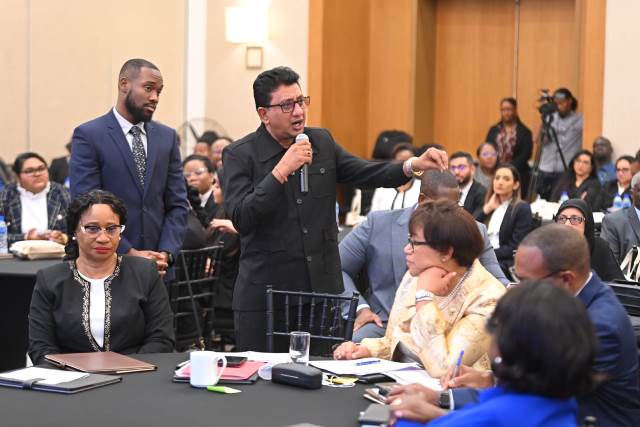Restorative justice units will be implemented within the Ministry of Human Services and Social Security’s probation centres nationwide to address rising crime rates and promote successful reintegration.
This is according to the Attorney General and Minister of Legal Affairs, Mohabir Anil Nandlall, SC, who made the disclosure during his presentation at the First Conference on Criminal Justice Reform at the Marriott Hotel in Kingston, Georgetown, on Thursday.
“These Probation Departments enjoy a functional relationship with the court systems across the country, particularly the Magistrates’ Court. We are twinning the services. That is to say, that each Probation Department will also offer restorative justice services,” he said.
The minister underscored that a restorative justice centre is already operational in Georgetown. He said too that the financial constraints and convenience concerns have led to the programme being merged with existing programmes at the human services ministry.
“There are striking similarities between restorative justice and the services offered by probation officers. I hope that there will be great synergy in the delivery of these services. More particularly, the probation officer and the restorative justice officer will both attend Magistrates’ Court so these services will be available to the Magistracy across the country,” Minister Nandlall explained.
Following the passage of the Restorative Justice Act in 2022, the government has embarked on a critical sensitisation and training campaign to fully integrate the doctrine into Guyana’s legal system.
Awareness sessions were conducted in several communities along the East Coast of Demerara in Region Four, Regions Five, and Six.
Community leaders, members of the disciplined services, religious leaders, and teachers are also being instructed in the tenets of the doctrine and its implementation.
Restorative Justice is an alternative approach that seeks to repair harm by providing opportunities for the victim and perpetrator to communicate about and address their needs in the aftermath, in a way that promotes healing, accountability, and understanding.
The approach forms part of the IDB-funded Support for the Criminal Justice System (SCJS) Programme, which was primarily launched to address overcrowding in prisons.
During his presentation, the AG emphasised that the traditional approach to justice has failed to address the root causes of crime and provide tangible solutions.
According to the legal affairs minister, the Caribbean continues to face high crime rates despite targeted approaches to strengthen law enforcement capabilities.
“The harsh and inconvenient truth is, that despite the use of these highly punitive sanctions, including death, crime has not only increased but has increased to unprecedented levels,” he emphasised.
The AG continued, “This morbid reality demonstrably establishes beyond doubt that penal sanctions and the conventional approach to punishment have abysmally failed to achieve the conceptual objective of deterrence.”
Moreover, he said that restorative justice is not open to all criminal offences but a few minor and petty offences, which can be dealt with at a community level, allowing for direct rehabilitative intervention.
According to the act, restorative justice applies to offences that carry a three-year and below penalty.

